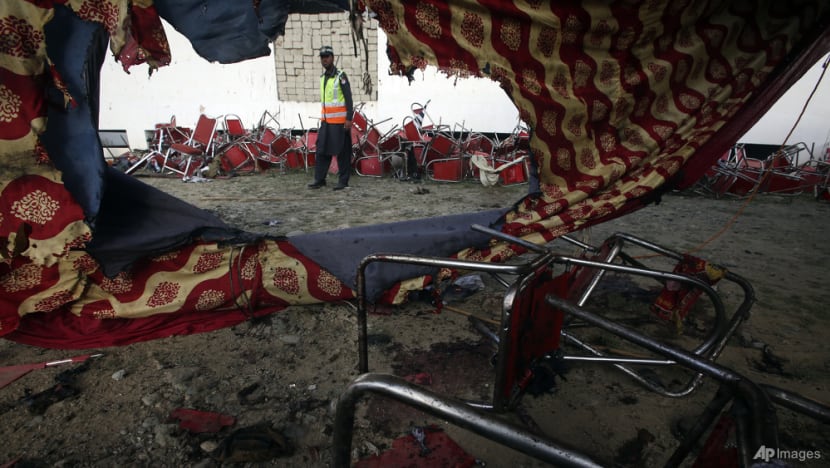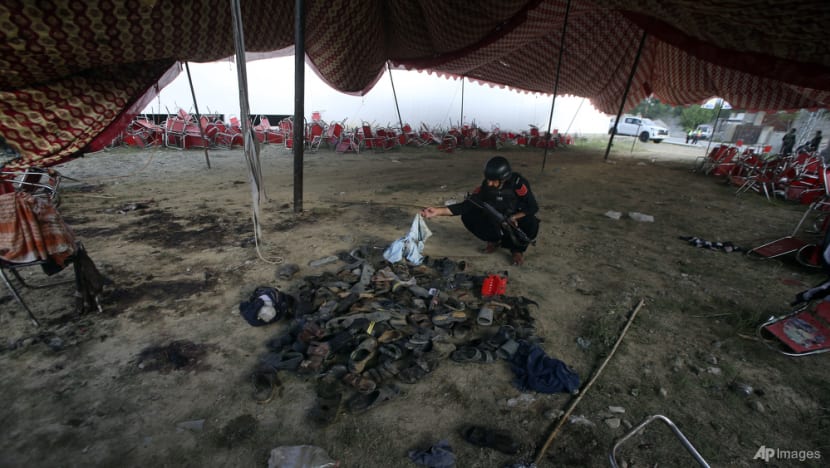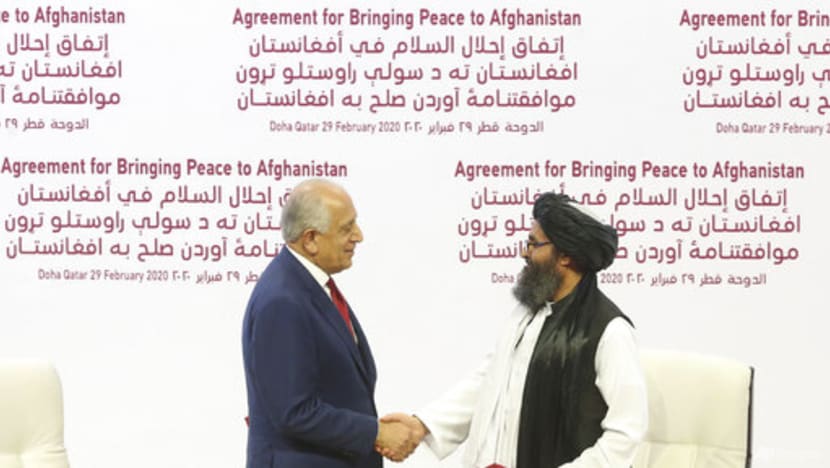Pakistan suicide bombing likely by Islamic State branch in bordering Afghanistan: Experts
At least 44 people were killed when a suicide blast occurred at a political gathering of leading Islamic party Jamiat Ulema-e-Islam-F (JUI-F) in northwest Pakistan.

SINGAPORE: The suicide bombing at a political rally in Pakistan on Sunday (Jul 30) was likely carried out by the Islamic State in Khorasan Province (ISKP), an Islamic State branch in Afghanistan, experts said on Monday (Jul 31).
At least 44 people were killed and over 100 wounded when the attack occurred at a political gathering of the leading Islamic party Jamiat Ulema-e-Islam-F (JUI-F) in northwest Pakistan.
Professor Greg Barton, chair in global Islamic politics at Deakin University, told CNA’s Asia Now on Monday that the ISKP has motive, logic and capacity to carry out the attack.
“We know that the Islamic State in Khorasan Province, the IS branch in Afghanistan, is in a bitter struggle with the Taliban. And we know that the political rally in Pakistan … was closely aligned with the Taliban in Afghanistan,” he said.
“And of course, unfortunately, this sort of suicide bombing bears the hallmarks of an Islamic State operation.”
Prof Barton said the group was trying to put pressure on the Taliban regime in Kabul by reaching out and embarrassing it across the border.
“Unfortunately, terrorism is a method of leveraging influence and getting attention,” he said.
“The fact that it attacked immediately across the border does not mean that it is not part of contestation within Afghanistan, but of course there's deep ideological conviction,” said Prof Barton, adding that the ISKP is opposed to the approach taken by the Taliban and parties like JUI-F.

Dr Khuram Iqbal, from Macquarie University’s department of security studies and criminology, said it was “the most plausible possibility” that ISKP was responsible for the attack, as the party targeted enjoys cordial relations with the Taliban.
“I will not be surprised if ISKP comes up with a statement claiming responsibility for this attack,” he told CNA’s Asia Now on Monday.
TALIBAN OPERATIONS
Prof Barton also pointed to the Tehreek-e-Taliban, a Afghanistan-based Taliban group targeting Pakistan.
While the government in Kabul has promised to crack down on Tehreek-e-Taliban, it still has not happened due to “lots of mixed motives and close family ties across these groups”, said Prof Barton.
“Pakistan, I think, had wishful thinking when it thought that the rise of the Taliban in Kabul would be good news for them,” he said.
“It's turning out, in fact, that both Tehreek-e-Taliban and the Islamic State are problems, not just for Afghanistan, but also for Pakistan.”
He said Pakistan had enjoyed a respite from terror attacks a couple of years back, but the rise in attacks over the last year plays into the military’s hands, as it speaks to the need for security.
“Pakistan has suffered tens and tens of thousands of victims, both uniformed personnel and civilians, from terrorist attacks over the last 20 years. This seems to be a return to that pattern,” said Prof Barton.
“It may make the military feel that they're more justified in controlling military power and perhaps can push off the elections.”
Dr Khuram noted that Pakistan has held general elections amid all sorts of terror attacks in the last two decades, such as in 2008, 2013 and 2018.
“Political parties in Pakistan demonstrated utmost resilience against these violent actors. They went ahead with their campaign and we have seen a successful organisation of elections amid all this terrorist activity,” he said.
The country’s next general election is due to be held by October this year.
“Such sort of (an) attack can discourage some political actors, but political parties in Pakistan generally are used to operating in difficult circumstances.”
AFGHANISTAN’S ROLE
Dr Khuram said Sunday’s attack was the latest in a series that have taken place in the tribal region of Pakistan in the last few months.
“This region shares borders with Afghanistan, and we have seen that after the Taliban takeover of Afghanistan, this region has witnessed a dramatic increase in the number of terrorist attacks in general and suicide attacks in particular,” he said.
He said that after returning to power in 2021, the Taliban has not been able to fulfill Afghanistan’s commitments made in the 2020 Doha Agreement with the US.

Under the agreement, the US withdrawal of forces from the country was conditional on Taliban security assurances that Afghan territory would not be used as a launch pad by terror groups.
“At the moment, there are more than 26 terrorist organisations of regional and international agenda, which are now operating from Afghanistan,” he said, adding that they have also launched attacks in Central Asian states.
Prof Barton said more pressure needs to be placed on the Taliban regime to handle the terror threat, but it remains unclear how to do so.
“They seem pretty resistant to pressure. They have got their own sources of income inside the country. They don't need foreign aid,” he said.
“I do think this is a reminder that we can't keep deluding ourselves, that if we just ignore the problems, things will get better in time.”
He added that the situation in Afghanistan needs to be taken more seriously.
“I think eventually it's going to be a problem for Southeast Asia, as people travel and are trained and are radicalised in Afghanistan, as we saw decades ago,” said Prof Barton.














